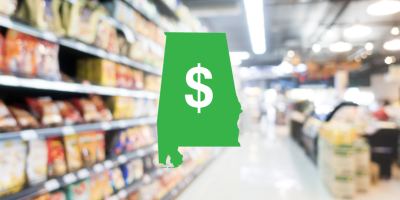
Starting September 1st, families in Alabama will benefit from a reduction in grocery sales tax. The state tax will drop from 3% to 2%, continuing the rollback that began in 2023. This change will also lift the previous limits affecting some counties and local governments regarding the local share of the grocery tax.
While a 1% decrease might not seem monumental to everyone, for Alabamians grappling with inflation and rising prices, it represents a significant improvement. That said, pushing for more substantial tax reforms—like completely eliminating the food tax and providing income tax relief—should be high on the agenda for Alabama’s lawmakers in 2026.
This grocery tax has seen a reduction from a previous total of 4%.
For quite some time, Alabama was nearly unique in imposing grocery taxes at the same level as other goods, with state rates reaching 4% and exceeding 10% in some localities. Until 2023, Alabama was one of only three states to place full sales tax on food, despite the burden it placed on many hardworking citizens.
Sales tax disproportionately affects those with lower incomes, as they often spend a higher percentage of their earnings on food. The Alabama Institute of Policy Studies has consistently advocated for change in this area. In 2023, a legislative effort led to a tax reduction from 4% to 3%, and implementing this next decrease ahead of schedule is certainly a step in the right direction.
Even with this relief, Alabama’s grocery tax remains higher than many neighboring states like Georgia, Florida, South Carolina, and Louisiana, where food is often exempt from sales tax. Alabama’s 4% rate had been quite high, and while the recent cut is positive, it should not mark the end of efforts to reform the system.
Impressively, the tax reduction was a bipartisan effort, receiving unanimous support in Congress and being signed into law by Governor Kay Ivey. She noted that these tax cuts aim to “offer some relief to hardworking people” in Alabama, illustrating that when lawmakers truly listen to their constituents, sound policies can emerge beyond party lines.
However, it’s essential to recognize that more work remains ahead.
Even after this reduction, Alabama still imposes a 2% state tax on groceries. Completely removing the grocery tax should remain a priority while also ensuring that the state can uphold its vital services. States like Alabama have shown it can be done.
The way forward necessitates exploring broader tax reforms, affecting not just food taxes but all areas of Alabama’s tax structure. Many states have successfully embraced comprehensive reforms over the past few years while enjoying budget surpluses.
Since 2020, over half of states have reduced individual income tax rates. Alabama risks falling behind when competing for new residents compared to states like Tennessee and Florida, which do not have an income tax. Neighboring states, such as Georgia and Mississippi, have also made historic tax cuts recently, with Mississippi eliminating its individual income tax at the start of this year.
On the corporate side, at least 12 states have cut their corporate income taxes since 2020. Alabama, however, still holds one of the highest rates in the Southeast at 6.5%, which creates a competitive disadvantage when trying to attract new businesses and create jobs.
Alabama’s financial health is relatively strong currently, which serves its citizens well, but there’s room for improvement.
Over the last five years, the state has seen a remarkable increase in both income and spending, with tax revenue surpassing $14.1 billion in fiscal year 2024. Yet, a significant chunk of this surplus is often reserved or designated for singular projects.
The Alabama Institute of Policy Studies argues that taxation should reflect the value delivered to residents—fair, transparent, and aimed at removing barriers rather than erecting them. State and local government roles are to support rather than hinder private sector services.
Ending the remaining 2% grocery tax could further ease financial pressures on Alabama families, but the upcoming legislative session should also focus on a broader tax reform agenda.
It’s high time for lawmakers to take decisive action and provide meaningful tax relief for all Alabamians.







